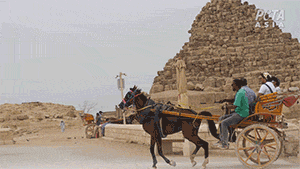UN INT Intro Text w/ Responsive Image - *Important Note* You must UNLINK this shared library component before making page-specific customizations.
Update (April 17, 2025): Sick, injured, or starving horses and camels are often abandoned by carriage operators who treat them like disposable tools. Now, following several PETA Asia investigations, a PETA-approved bus transport system at the Pyramids of Giza is launching. Horse and camel operators are protesting the new animal-free transportation, because the electric buses will make it easy to navigate the historic site without supporting horse and camel rides. Please take action to help horses and camels forced to work in the tourism industry in Egypt.
Original post:
In 2019, PETA investigations into Egypt’s top tourist sites, including the Giza pyramids and Luxor’s royal tombs, documented horses and camels enduring disgusting abuse. 😨 🐎 🐪 The horses were whipped and forced to haul tourists in carriages, and the camels were forced to be props for pics in the blistering heat without food or sufficient shade. 🥵

When PETA first blew the lid off this abuse, Egypt’s Ministry of Tourism and Antiquities promised to make meaningful changes. But when investigators went back years later, in 2023 and 2024, many problems hadn’t been solved. 😒 Authorities hadn’t even bothered to set up appropriate shade for the hot animals at the pyramids. A ministry spokesperson straight-up admitted that the goal of any improvements was to benefit tourists—not the abused animals. 😡
Watch this vid to see just how severe and widespread the abuse of horses and camels in Egypt is—and share it with your friends and fam.
Exhausted horses are forced to carry tourists in scorching temps and are often whipped. 😰 The animals are constantly hungry and tired and are denied veterinary care for wounds and injuries.
PETA investigators went behind the wall of the ticketed tourist area at the pyramids and found dead bodies of horses dumped in the trash every single day. 😱 They also found the dead body of a camel. Just steps away from these rotting bodies, malnourished horses were eating food from piles of trash. One time, investigators found a horse who was barely alive and had been left to die in agonizing pain. 😓

Instead of working to stop this shameful abuse, the police and gov authorities work with the handlers to intimidate worried visitors at the tourist sites. 🤦 Once, the police and a rep from the Ministry of Tourism and Antiquities detained a park visitor who had been taking photos at the pyramids and demanded that they delete any footage of the camels and horses. The authorities claimed that it was against the law to photograph the animals, but they were capping hard. 🙄 🧢 Then they snatched and wiped the visitor’s SD card. While this was taking place, horses were being violently whipped around them—but the authorities didn’t care about this abuse. 😠
At the notorious Birqash Camel Market, where many camels are sold into the tourism industry, investigators found that camels are still being abused and that the throats of some had recently been cut. Men pushed the camels and beat them with batons. Traders pulled the animals’ lips and ears, punched them, and prodded their testicles. 😭

Camels from the tourism industry are also sold to slaughterhouses to become slabs of meat. They’re killed in full view of other animals—and even in front of children. 😲 😢 One camel whose throat had been slashed kept kicking for four minutes before a worker hacked at the animal’s neck with a machete.

Take Action!
Here’s the thing: When tourists pay to take horse or camel rides, they keep this cruelty going. But now that Gen Z is traveling more, we have a huge chance to drive down the demand for these rides and help prevent animals from suffering. 💪 There are plenty of ways to experience a new culture, explore nature, and sightsee without harming animals—and when we speak up for animals together, we can help end exploitation in tourism.
Please use the form below to urge Egyptian officials to end this cruelty and ban the use of horses and camels to entertain visitors at the pyramids and other tourist sites. 🙏 And if you’re planning to visit Egypt, don’t force animals to be part of your outing.